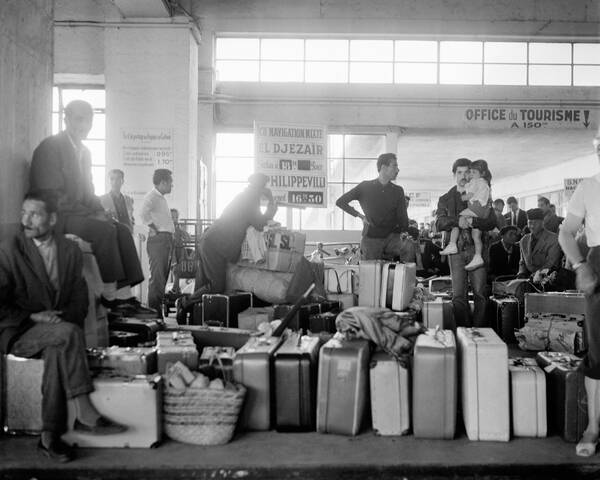You are now entering the Jewish Currents archive.
by Esther Cohen
Before she got to America, Rivka met Shmuel in her uncle’s lending room in Bobst.
SHMUEL LIKED RIVKA, too. He watched the way she stood in the Bobst lending room her uncle ran, a room some people called a bank, the wrong word, Shmuel knew, too grandiose for her uncle and that small dark upstairs room. He saw her and he thought about how someone who looked exactly like Rivka could be the wife he needed. The wife he was looking for.
He spoke to her in Yiddish, gently, and although she was entirely unaccustomed to strange men saying anything at all to her, she did not look away.
“What are you doing here?” he asked.
She did not want to tell him the truth. She wanted to lie, even though it was their very first conversation. In fact, she had no reason to lie.
“I am here to see my Uncle,” she said, and looked right at him. And he looked right back and she felt different than she’d ever felt before. Her sturdy body began to tremble a little. She hoped he didn’t know that.
“Why are you really here?” he continued. Shmuel was a big man, but his voice was smooth and easy to listen to.
“Don’t you believe me?” she asked. “Or not?” She knew he had no reason to believe her.
“I’d like to believe you,” he said and smiled, and although she did not know the word ‘flirt,’ she knew full well that he was doing something. And she liked it.
“All right,” she said, with no further prompting. “I’ll tell you. But I am actually very nervous about saying this out loud. I am going to America,” she said. “To my other uncle, to Label in New York. Label Feinstein, my mother’s brother. He traveled a while ago, and he wrote to us and said he had room, plenty of room. He told me I could come and work and stay with his family. He married an American, and they live in the city. The only city I’ve been to is Kaunas. Twice. That’s all I know,” she said, and this time, when she looked over at him, he actually looked silenced by her words.
“Well,” he said, to buy himself time. And then he repeated himself. “Well,” he began, “how can I marry you if you’re going to America?”
“You’ll find a way,” she said, although when she heard her own words, she wasn’t sure.
“I’m leaving, too. In two weeks,” he told her. “I am going to South Africa, to a cousin in Johannesburg. Jews are welcome, and there is work. My cousin said there is plenty of work. Would you consider South Africa instead?”
“I have my ticket. I have my plans,” she said. “But I will give you the address of my Uncle Label. Do you think you’ll write to me?”
“I don’t think. I know,” he said. They walked over to the counter, and she wrote out her name very carefully, using English letters. Her name was all she could write in English. She’d memorized Label’s address: 109 Orchard Street. She gave that to Shmuel Feigenbaum, too, and when they said goodbye, shaking hands, it felt more momentous than their brief encounter deserved.
Esther Cohen’s novels include Book Doctor and No Charge for Looking.
